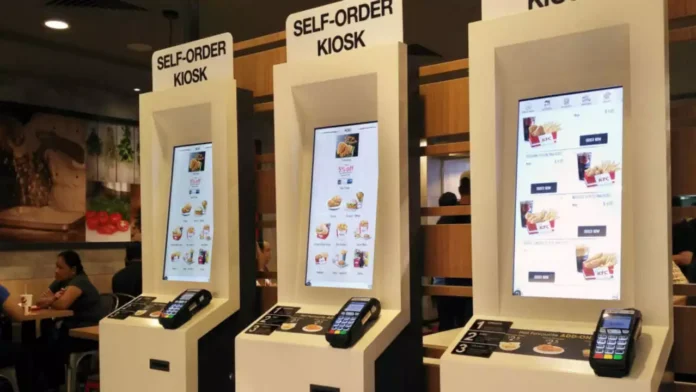According to a study conducted by RBR Data Services, a division of Datos Insights, a research and consulting firm, the global installations of restaurant kiosks surged by 43% in the two years leading up to June 2023, reaching almost 350,000.
RBR Data Services predicts that the global installations of kiosks will reach almost 700,000 by the year 2028.
“With hospitality overheads continuing to skyrocket globally and minimum wage increases planned in many developed countries, restaurant chains of all sizes will introduce kiosks or expand existing rollouts as a way of rationalizing their operations and boosting transaction values,” Chris Allen, who led RBR Data Services’ Global Self-Ordering Kiosks 2024 research, said in a press release.
McDonald’s Dominance: Leading with Over 130,000 Kiosk Units
According to the report “Global Self-Ordering Kiosks 2024,” McDonald’s maintains its position as the leading global adopter of this technology, boasting over 130,000 units installed. However, both Burger King and KFC have significantly increased their international deployment of kiosks, extending their presence from Romania to the Philippines.
The report found a significant surge in restaurant kiosk installations in the Asia-Pacific region, primarily attributed to the substantial expansion of the Chinese chain Dicos, which more than doubled its estate. Additionally, several South Korean brands, including Lotteria, Mom’s Touch, and A Twosome Place, have extensively implemented kiosks throughout their store networks.
In Europe, the Middle East, and Africa, among these are local chains and global quick-service restaurant (QSR) brands pursuing a digital store model that includes kiosks. France’s BCHEF and Poland’s Pasibus, for instance, have rolled out the technology to all their restaurants.
North American chains are expanding their presence beyond their domestic markets into EMEA, establishing stores with kiosks as a standard feature. Notable examples include Taco Bell in the U.K., Dunkin’ Donuts in Germany, and Pizza Hut in Saudi Arabia.
The largest regional kiosk market is found in the Americas, where the U.S. stands out with over 110,000 installations. Not only are international quick-service restaurant (QSR) giants making their mark, but domestic chains like Shake Shack, Brazil’s Habibs, and Argentina’s Mostaza are also rapidly adopting and deploying this technology.
While major global chains like McDonald’s still prefer the largest-sized standing and double-sided models, there is a notable surge in the popularity of small and medium-sized kiosks, including tablet-based solutions, on a global scale. Kiosks featuring screen sizes between 19 and 30 inches currently constitute half of the global market.
Local Chains Embrace Kiosk Innovation: Countertop and Tablet Solutions
Countertop kiosks and tablets are gaining momentum among local restaurant chains such as Black Sheep Coffee in the U.K., Pokawa in France, and Arctic Circle Restaurants in the U.S., driven by space and budget constraints.
As food prices, labor costs, and supply chain vulnerabilities continue to escalate, restaurant chains are increasingly recognizing the compelling business case for implementing kiosk technology as an efficient way to cut costs. Fast-food operators are also noting a rise in average transaction values directly attributable to the installation of self-ordering kiosks.
Continue Exploring: From smart kiosks to AI-powered chefs: How artificial intelligence stirred up the food business and restaurants in 2023





